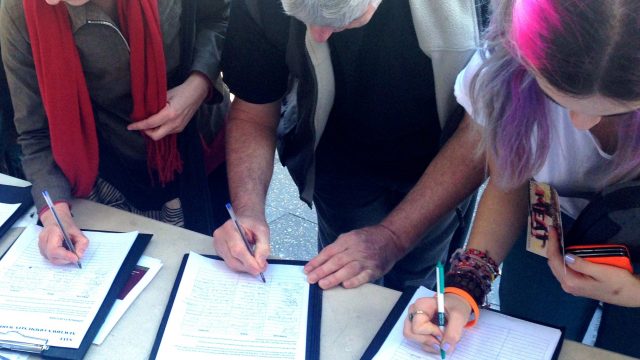Is North Dakota Getting Carried Away With The Ballot Measures?

Currently Secretary of State Al Jaeger’s office is reviewing signatures submitted by three ballot measure committees. If there are enough valid signatures, those three measures will join five already on the ballot bringing the total number of measures voters will be considering in November to eight.
That’s more than any of the last 15 statewide ballots going back to 2000. It’s the most since 1996 saw nine ballot measures.
Ballot measures come in two different flavors. Constitutional amendments are put on the ballot by the Legislature because that’s required by state law. The Legislature cannot amend the state constitution without a vote of the people. Other measures are put there by voters who sign petitions to support creating new laws, or to repeal existing ones.
Looking only at measures originating with the people, in the 8 elections from 2000 to 2008 citizens put a total of five measures on the ballot. From 2008 to 2014 – assuming all of the aforementioned measures make the November ballot – citizens will have put 14 measures on the ballot.
Which makes me wonder…are we getting carried away?

But my support for these things hinges on the idea that the process is the result of actual North Dakota citizens organizing and acting. I’m not sure that’s been the case of late.
Look at the North Dakotans for Clean Water, Wildlife and Parks for instance. While “North Dakotans” may be in their name, there aren’t many citizens of this state who have given the group money. We have no idea how much the group has raised and spent in 2014. Measure committees are only required to report that stuff twice a year – 32 days before election day and at the end of the year – which is something that really needs to change. But looking at the groups fundraising and spending through 2013 (they began their petition drive in August of last year) we can see they have raised roughly 95 percent of their cash from out of state, and spent that money at a pace which works out to about $8 per signature.
And, again, that’s not counting whatever they may have raised and spent in 2014.
What we’re looking at is a coalition of deep-pocketed activists buying their way onto the ballot in the hopes of legislating on election day. Is that really in keeping with the spirit of the initiated measure process?
Before I’m accused of griping about the conservationists just because I don’t like their measure, let me point to another example from this cycle which gives me the creeps. On June 3rd backers of a petition to repeal North Dakota’s pharmacy protectionism were approved to begin collecting signatures. On July 18th the group turned in nearly 24,000 signatures, almost 11,000 more than needed.
In about six weeks, the group collected almost 24,000 signatures at a clip of about 8,000 signatures per week. That’s both amazing and a little scary.
There is no question that this group is well funded – corporate interests like Walmart have long desired the repeal of the law – but we don’t know anything about their fundraising and spending until later this year (again, these disclosure laws need to change).
I don’t think we need to see the disclosure to know that they spent a ton of money on petitioners to collect 8,000 signatures per week, though. I plan on voting for this measure, but the way it was put on the ballot gives me pause.
I believe that political spending is a form of speech, and I have no problem with people who have organized themselves into corporations participating in the political process. But I’m a little concerned about the threat of direct democracy. I’m worried about this state being governed not by our duly elected members of the Legislature and executive branch, but by the mob casting their votes for whatever zany ideas make it to the ballot box.
America’s founding fathers were no friends of this sort of direct democracy. The American system of government was created as a representative democracy in the form of a constitutional republic. We protect ourselves from the whims of the masses – from the “tyranny of the majority” – by electing legislators and a chief executive to propose, debate and ratify policy.
It’s not perfect, but it has served us well. Unfortunately, here in North Dakota, these days any faction with a million bucks to spend can put their issue before voters and stand a pretty good chance of winning.
What can we do about it? North Dakota voters passing Measure 1 on the June ballot (put there by the Legislature) to give the Secretary of State more time to review ballot measures was a good first step. Measure 4 on the November ballot which, if passed, would disallow constitutional measures that order the Legislature to make appropriations is another good step.
But I think we need more. The problem is…what? How do we protect the process from people just buying their way onto the ballot, while preserving it for genuine citizen activism?
I’m not sure I have a good answer.




